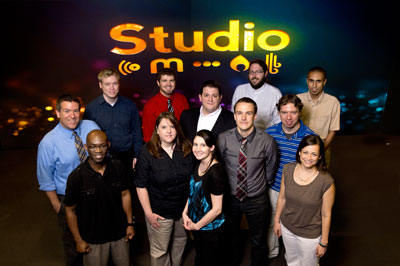Teaching & Learning | Innovators
Purdue University
In an era when social media and mobile tools have become integral to campus life, the IT group at Purdue University (IN) is harnessing the technology to produce a growing suite of software, Purdue Studio Applications, all designed to enhance student learning. Three of these applications--Hotseat, Mixable, and DoubleTake, implemented at Purdue in 2009, 2010, and 2011, respectively--leverage social media and common mobile technologies to boost engagement, collaboration, and, ultimately, student success.

Purdue University's Studio Applications team (photo courtesy of Purdue University) |
Each product addresses a unique application area while being flexible enough to accommodate a range of instructional uses. Hotseat is designed for "classroom microdiscussion" and employs a Twitter-like interface that enables a flow of student questions and comments in a classroom setting. Mixable uses the social web to help students create their own learning networks and study groups, and allows them to exchange course materials via Dropbox. DoubleTake simplifies instructional video: Students can use their cell phones to capture, share, and watch videos.
The applications are tailored to the academic environment, notes Kyle Bowen, director of informatics at Purdue. "We wanted to deliver these tools in a course context, so that people can access sites dedicated to course-related information without the distractions or other challenges that may come with the wider social software environment."
A big part of these products' success is that they leverage technologies that most students are already using. While administration of the Purdue Studio Applications is relatively easy, the institution does need to be alert to issues of connectivity and bandwidth. "Our studio applications have a heavy reliance on mobile access to information," explains Bowen. "So, we worked with Cisco to begin outfitting our classrooms with new wireless networking to accommodate the higher levels of usage. By extension, that's where Verizon Wireless is also a partner--they brought their LTE 4G technologies to Purdue, which allowed us to have higher amounts of bandwidth available to our students on the cellular network as well."
Hotseat, Mixable, and DoubleTake were each piloted for a semester and then made available campuswide. All have enjoyed significant popularity on campus and are used in numerous courses. The first product launched--Hotseat--has been used by more than 10,000 students. The university is considering software licensing options, so other colleges and universities could deploy the applications. For example, Purdue is negotiating a licensing agreement with McGraw-Hill to make Hotseat available to other institutions.
Commercialization is a key piece of Purdue's cycle of technology development, notes Bowen. "It's part of developing these tools that we can potentially deliver them to market through a variety of mechanisms--like licensing through a company, or developing a startup, or forming a consortium," he says. "Our interest as an institution is helping our own students be more successful, but, at the same time, to deliver this technology to market. The key question we ask ourselves is, How can we best make this technology available to others?"
About the Author
Meg Lloyd is a Northern California-based freelance writer.

